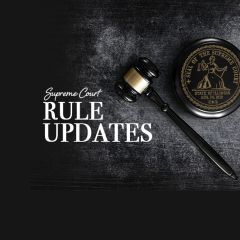Attorneys Barry Hines and Andrew White discuss the two major types of Illinois farm leases.
Practice News
-
September 20, 2019 |
Practice News
1 comment (Most recent September 26, 2019)
-
September 19, 2019 | Practice News

The Illinois Supreme Court handed down four opinions on Thursday, September 19. In Accettura v. Vacationland, Inc., the court clarified the distinction between rejection and revocation of acceptance for purposes of the Illinois version of the Uniform Commercial Code. In Carmichael v. Union Pacific Railroad Co., the court provided instruction on what is a proper counterclaim under section 2-608 of the Code of Civil Procedure and explained that a counterclaim is an independent, substantive cause of action that seeks affirmative relief and must stand or fall on its own merits. In People v. Custer, the court considered whether to extend the procedures established in Krankel and its progeny to proceedings commenced under the Post-Conviction Hearing Act and declined to do so. In People v. Smith, the court upheld the convictions of two defendants for aggravated battery of a senior citizen.
-
September 17, 2019 | Practice News

The Illinois Supreme Court on September 17 amended Rules 610, 613, 901, and 1101. All changes are effective immediately.
Amended Rule 610 alters the requirements for information to be included in motions for extension of time in criminal cases.
-
September 16, 2019 | Practice News

The Illinois Supreme Court announced the filing of lawyer disciplinary orders on Sept. 16, 2019. Sanctions were imposed because the lawyers engaged in professional misconduct by violating state ethics law.
-
September 16, 2019 |
Practice News
While it has long been recognized that there is a separation of powers under the Illinois Condominium Property Act between condominium boards and unit owners, condominium boards have possessed almost all of the decision-making authority under the Act, including deciding rule violations. But, according to Ellis Levin in his September 2019 Illinois Bar Journal article, “Power to the Condo Unit Owner,” that power has shifted in Boucher v. 111 East Chestnut Condominium Association. In Boucher (Justice Neville’s final appellate opinion before joining the Illinois Supreme Court), the balance of power has shifted from condominium officers and boards to unit owners when unit owners protest rule violations and request meeting records.
-
September 11, 2019 | Practice News

Attorney Howard Ankin discusses section 8(d)(1) claims, which involve people who cannot go back to work for a former employer and have questions about potential earnings.
-
September 11, 2019 |
Practice News
The Illinois Supreme Court has announced that retired Circuit Judge Milton S. Wharton has been assigned as an appellate court justice in the Fifth District.
Judge Wharton was assigned to fill the vacancy created by the retirement of Fifth District Appellate Court Justice Melissa Chapman, who will retire effective Oct. 2. Judge Wharton’s assignment will take effect on Nov. 1 and conclude Dec. 7, 2020, following the November 2020 general election. Judge Wharton will not be a candidate in the race to fill the vacancy permanently.
1 comment (Most recent September 11, 2019) -
September 11, 2019 | Practice News
Justice Anne M. Burke has been elected as the next Chief Justice of the Illinois Supreme Court.
She was sworn-in on Sept. 10, with an effective date of Oct. 26, 2019 through Oct. 25, 2022. Justice Burke is the state’s 121st Chief Justice and will be the third woman to serve as chief following the late Justice Mary Ann McMorrow and Justice Rita B. Garman.
2 comments (Most recent September 12, 2019) -
September 9, 2019 |
Practice News
The Illinois Bar Journal’s September 2019 cover story, “A Path to Leadership,” details the ISBA’s proactive efforts to develop the Association’s next generation of leaders by launching a Leadership Academy. “We’re looking forward to this program,” says ISBA president David Sosin, who practices at Sosin, Arnold & Schoenbeck in Orland Park. “It will be one of the more exciting programs on a continuing year-after-year basis for our young members. It will not only pay great dividends to the Illinois State Bar Association, but to bar associations across the state for many years to come.”
-
September 3, 2019 |
Practice News
Arguably one of the most significant developments in recent Illinois criminal justice reform was Public Act 100-284. Signed into law on Aug. 24, 2017, this amendment to the Illinois Criminal Identification Act (ICIA) enacted among the nation’s broadest sealing and expungement reforms to date. As a result of the ICIA (one might also add the automatic expungement provisions included in the Cannabis Regulation and Tax Act signed into law this summer), there has never been a better time to file an expungement or sealing petition in Illinois. But clients seeking to take advantage of criminal record reforms are going to have questions—lots of them. You’ll need answers. In his September 2019 Illinois Bar Journal article, “Make It Go Away,” criminal-defense attorney Paul Meyers examines typical questions and concerns clients have when pursuing relief under the ICIA.


